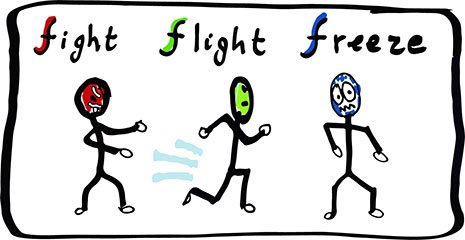Should we delete these mental disorders from the book of labels?

What if depression, anxiety disorders and post-traumatic stress disorder (PTSD) were to be deleted in the near future as purely medically qualifiable psychological problems? This week, Forbes published an article on a compelling new paper in which biological anthropologists calling to think in completely different terms about mental health. A vision with a potentially significant impact on the existing imaging and on different treatment methods.

(Anyone who likes to study the paper extensively: this is the place to be.)
Let me start how Forbes summarizes the findings:
With a thorough review of the evidence, they show good reasons to think of depression or PTSD as responses to adversity rather than chemical imbalances. And ADHD could be a way of functioning that evolved in an ancestral environment, but doesn’t match the way we live today.
Adaptivity
Mental problems are routinely treated with medication and thus also seen as a medical matter. In contrast, there is the claim that these "disorders" are not medical at all. (1) To begin with, it is argued that to date science has never been able to prove that anxiety, depression or PTSD are hereditary conditions. (2) Second, the researchers describe, the curves do not flatten despite the widespread and increasing use of antidepressants. Between 1990 and 2010, the counter for severe depression and anxiety disorders worldwide always stood around 4%. At the same time, the evidence grows that antidepressants work little or no better than placebo.
(3) As a third argument, it is put forward that the figures worldwide continue to fluctuate around 1 in 14 people, yet: "in conflict‐affected countries, an estimated one in five people suffers from depression, PTSD, anxiety disorders, and other disorders,” they write. Based on this thinking pattern, the authors posit that anxiety, depression and PTSD may be adaptive responses to adversity.
In this way, they see our defense mechanisms as adaptations that are activated to limit our health loss as much as possible in threatening situations. When applied to fear, you could see fear and anxiety as a way to avoid danger. But what about depression? The argument goes that the psychic pains of depression help us to focus attention on adverse events in order to mitigate the current setback and avoid similar situations in the future. Interesting, isn't it?
Anyone who spontaneously says "bullshit", consider the fact that more and more neuroscientists are convincingly linking these three disorders to our threat detection system. You can see fear as a chronic activation of our flight or fight reflex. PTSD is then a trauma-triggered freeze response, which essentially helps animals to disconnect from their suffering before they die. Depression would then be a chronic activation of that same freeze response.

The book of labels
Labels are things that we integrate to define who we are and what we are or are not capable of. Very often - if not always, let's be honest - these labels limit us. For that reason alone, reviewing the current view on anxiety, depression, ADHD,… should be high on the social agenda. Do you want to keep seeing depressive feelings and thoughts as a medical problem? Or can you also look at it as an adapted response to destructive events? Setbacks are something we can survive, while the stigma of mental illness leaves us almost lifelong with 'something we have to manage'.
Although the criticism of the current approach to mental (un) health is very justified, the aim of the study is not to change treatment in a rush. However, the goal is to explore new ways to study these problems.
Research on depression, anxiety, and PTSD, should put greater emphasis on mitigating conflict and adversity and less on manipulating brain chemistry.
The most important shift that needs to be made is about perception. Recovery is always determined in part by patients' views of their chances of getting better. The reasoning that their symptoms might be a natural response to negative experiences could be encouraging in that regard. "Am I not a broken factory after all?"
Remove diagnosis from the throne?
In itself, this biopsychosocial look at things is nothing new under the sun.
Until social reform actually does remove social causes of suffering, physicians must continue to provide the standard of care to our patients. The history of medicine is a story of healers using the best treatments they had at the time, until better ones arrive. - Forbes
Personally, I would not organize care in a label-based manner: you have this, you have this, you have this. Which doesn't mean that labels are completely meaningless. Certain people's discomfort stabilizes when they are being labeled. But as mentioned before, they also have to believe they can get better. When they are told that their behavior is actually a normal response to adversity, it could be very encouraging...
